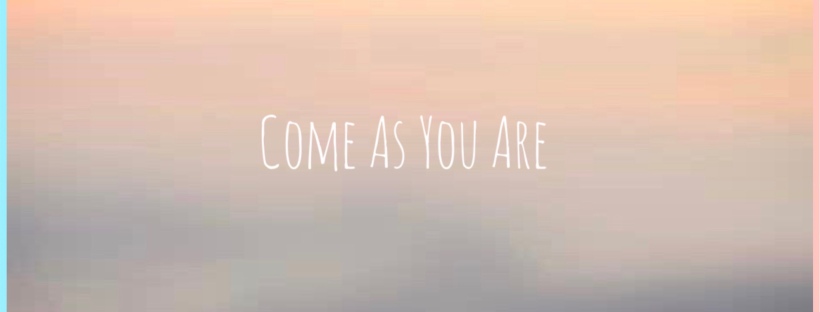The 2019 theme of ED Awareness, Come As You Are, ‘highlights NEDA’s movement towards inclusivity in the greater eating disorder community and sends a message to individuals at all stages of body acceptance and eating disorders that their stories are valid.’
For me and I’m sure thousands of others either suffering or in recovery, this is the most powerful theme so far. It forces us, the public, to reconsider our beliefs about individuals with ED’s. What image does your mind immediately conjure when we say the words Eating Disorders? I’m guessing that age old stereotype of an emaciated young, white female with sunken eyes, protruding ribs and a whispy, ghost like fragile air about her.
What we don’t see is the super ripped professional athlete addicted to exercise and training through painful injuries. We don’t see the ‘clinically obese’ individual who exhibits all the symptoms of anorexia yet is dismissed because she is overweight. We don’t see the teenage boy who looks in the mirror and is consumed with negative thoughts about his physique, what he eats, how much he goes to the gym. We don’t see the Indian mother of two who purges after every meal just as a way to feel autonomy again over her own body.
 Beautiful image by @meandmyedart
Beautiful image by @meandmyedart
Did you know that:
- Black teenagers are 50% more likely than white teens to display bulimic behaviours
- African American women’s ED behaviour is less likely to be identified as problematic by clinicians and are less likely to be referred for professional help
- Among males who have ED’s, nearly half of them identify as gay
- Females identified as lesbian/bisexual are 2x more likely to report binge eating
- Sub clinical ED behaviours (eg fasting, laxative and diet pill use, over exercising) are pretty much equal between men and women
- The risk of mortality for males with EDs is higher than for females
- 13% of women aged 50 and above have experienced eating disorder symptoms
Our stereotypes can have an immense impact on:
a) whether or not individuals choose to seek treatment – there is an average of 3.5 years between the onset of symptoms and the first time treatment is sought
b) how seriously medical professionals take these individuals. Did you know that medical students receive less than 2 hours of training on eating disorders over 4-6 years of their undergraduate course? Yet GP’s, for the majority of us, are our first port of call when we’re struggling. Lack of training in this area has been shown time and time again to be putting sufferers lives at risk, and increases the likelihood that those falling outside the typical Anorexic stereotype will slip from the system.
I am a cis-gendered, able-bodied, white, middle class woman who suffered with an eating disorder from the age of 16. I was Anorexic, yet it wasn’t a word I’d ever use to describe myself. I was only significantly underweight for around 20% of the time that I suffered and because of this, because of being a normal weight the rest of the time, I refused to acknowledge I needed help, that I was ill, that there was even anything wrong at all. It didn’t matter than I hadn’t had a period for 3 years or that I was choosing exercise over lectures, sleep seeing friends/family etc. It didn’t matter that I was exhausted or that my hair and skin were flaking or every second thought was about food or weight. I couldn’t be Anorexic – I still ate food other than lettuce and laughed and drank and was semi-sociable (as long as I’d been to the gym that day of course). I was a completely normal weight and had curves and cellulite and wobbly bits. In my mind Anorexic people sat in their room nibbling kale, too tired to go out whilst their families desperately tried to get them to eat a cheese burger. My family didn’t even know I had an eating disorder. I couldn’t be sick enough. Right?

To look at these photos you would think I was ‘recovered’ on the right. I had gained weight, my body looked healthy again, my period had come back. You wouldn’t think it to look at me but I was still suffering painfully, probably even more than the photo on the left. I would never have dreamed of seeking help, because in my mind others needed it so much more than me. It has been proven that those who suffered with the same illnesses I had, namely Atypical Anorexia and Orthorexia (an unhealthy obsession with, well, health ironically) are much, much less likely to both ask for and receive help. Why? Because we are almost always a ‘healthy’ weight.
Come as you are encourages anybody, everybody who needs help to come forward. You deserve help no matter your gender, size, weight, age, ethnicity, sexuality. You deserve help whether or not you think you look/are ‘sick’ enough. You deserve help because you are a human being and you deserve the best shot at happiness.
You are valid and there is always some who will hear you. Come as you are.

If you or anyone you know is struggling with an Eating Disorder please contact Beat, the national eating disorders charity who is always there to offer an ear:
Phone: 0808 801 0711 (young people) 0808 801 0677 (adults)
Email: help@beatingeatingdisorders.org.uk
Website: https://www.beateatingdisorders.org.uk/contact-us
Lots and lots and lots of love,
Kirsty xxxxxx
Email: baines.kirsty@hotmail.co.uk
Instagram: @thekirstyway
Facebook: Kirsty Louise
